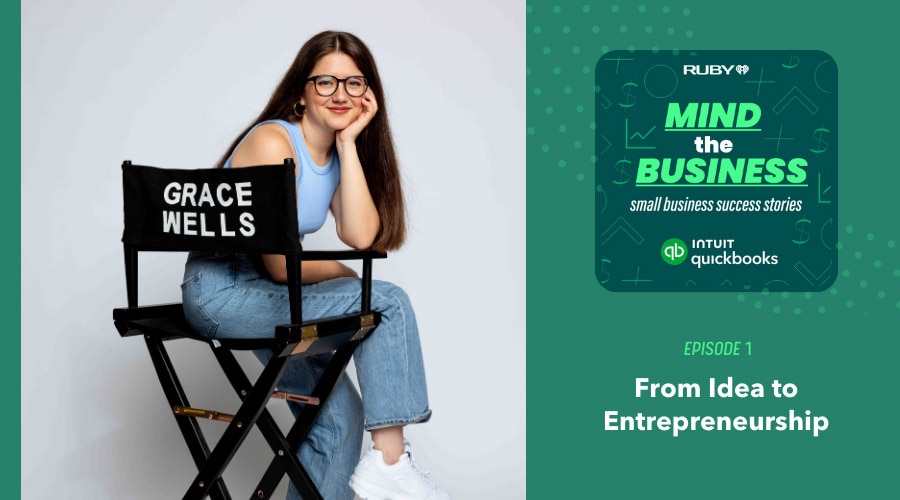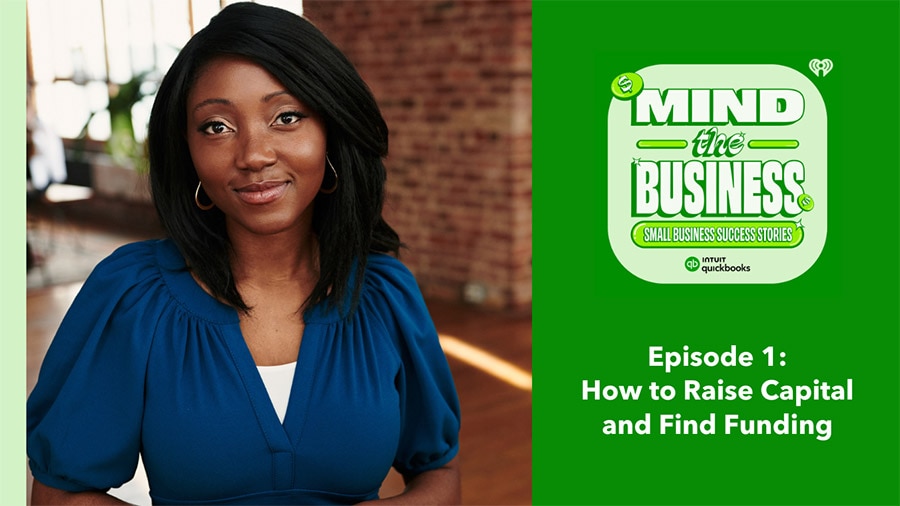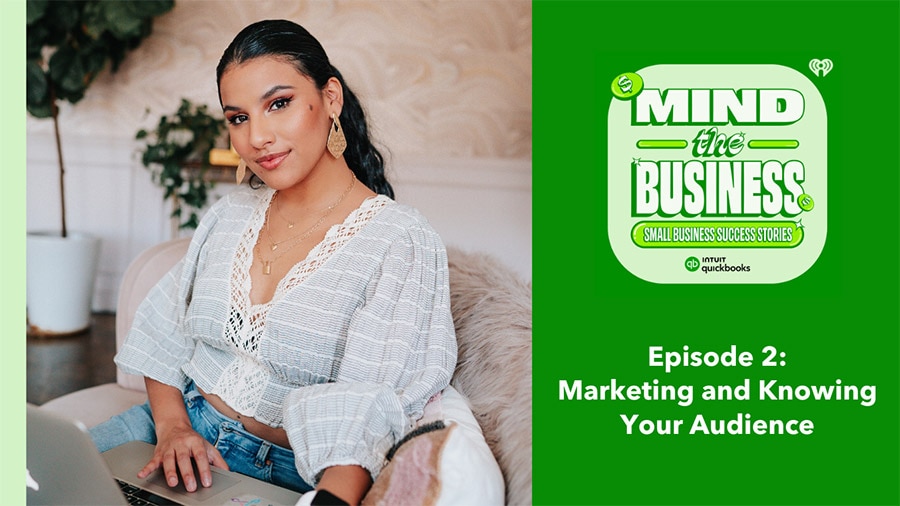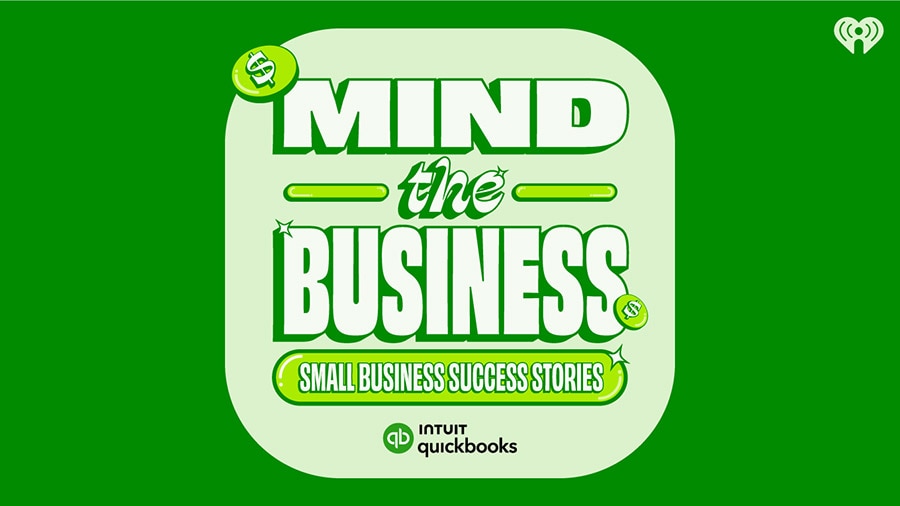Owning a small business can be one of the most rewarding and challenging things a person does. Amid an uncertain economy and ever-evolving consumer trends, there is a lot to figure out and navigate to ensure your business thrives. Join hosts Jannese Torres (Yo Quiero Dinero) and Austin Hankwitz (Rate of Return) as they connect with small business owners and hear their stories about managing the ups and downs of starting and growing a small business. Listen and learn valuable lessons from their experiences that will guide you along the way through your own small business journey.

From idea to entrepreneurship: Getting started in solopreneurship with Grace Wells
Grace Wells was just having fun with her camera in her college apartment when she decided to upload a series of videos she called “Making Epic Commercials for Random Objects.” One video, featuring a fork, went viral on TikTok with over 2 million views. She was soon approached by businesses for their social media ads.
After one ad for a soda company garnered a whopping 8 million views, Grace attracted even more brand deals and found the confidence to leave her job and make videos full time. She now runs her own business as a filmmaker and photographer where she creates content for major brands. while also showcasing her creative techniques on social media.
Austin Hankwitz: Grace, I am so excited right now. I've seriously been following you on TikTok for over two years. And when I found out that we were having you on the show, I literally went and rewatched like 40 of your videos. It's so fascinating to me to watch someone go from making unique short form video content on the internet to directing films and creating real commercials for major brands. We're going to get into all that — but I wanted to sort of kick off this interview at the beginning.
You were on a very different path to begin with, studying linguistics with a postgrad job lined up at Grande Cosmetics. So before your videos were going viral, did you ever consider a career in commercial filmmaking?
Grace Wells: Yeah, so it was right around my junior year of college that I bought my first camera. And the idea of pursuing videography or photography as my career post grad… it was a very gradual process. At the beginning, this was very much just a creative outlet because I found myself feeling very creatively unfulfilled. So it just kind of was like, “Oh, I'm going to buy a camera and I'm going to take some portrait photos for my friends,” like it was going to be this fun little thing.
And I don't know where it came from, but this drive kicked in where I was like, okay, what's the next thing? What's the next goal? Where's the next milestone? And so. I think I would be on this path even if the stuff was not blowing up on social. I think that it gave me a big boost of confidence as well as like, okay, even though I don't have a formal education in this field and I just did my degree in something totally different, I can actually do this.
AH: Absolutely. Right. Starting with taking some portraits, filming some forks and potatoes and books, and now you're doing the cool stuff. So let's talk about that, right? Epic commercials for random objects. Part one. That was a video you had published. How did you come up with it? So
Grace: It really was from necessity. That was the moment where the pandemic really was in full swing. I think this was a very interesting turning point for a lot of creatives. For me, that meant, okay, I can no longer go out and work with models the way that I had been before.
So the idea for making a commercial for a random object — it was just sort of like, “Okay, what can I do in my house that I don't need anyone else for?” I can do this 100 percent all my own. I thought that it would be a fun creative challenge. The idea of making a commercial for a fork, something that you would never, ever, ever see a commercial for, would really push me creatively a lot more and it would kind of force me to not rely on references that I'd seen in the past. Even though I did think at the time that it might be a series, the three videos turned into so much more than that.
AH: When did you realize that your creative abilities were strong enough to begin to monetize? What, for you, was that big breakthrough moment? Was there any imposter syndrome along the way?
Grace: Oh, I mean, there's still imposter syndrome. I would say that the monetization aspect really kicked in towards the beginning of 2021. So I'd been doing this for a little over six months, I would say. And that's when the brand Celsius reached out to create a commercial for them. Very few brands reached out at the beginning. And I think that part of that was that TikTok was still foreign territory for a lot of brands at that point in time. So that was the first video that really was like..”Oh, someone wants to hire me. That's cool.” And then that video actually ended up performing incredibly well. So not only does someone want to hire me, but people actually want to watch it. Which to me, I would have thought, if it's branded, like no one's going to watch this video, right? And that was really what got the ball rolling on other brands reaching out to me. And then I eventually left my job a little bit later that year.
Jannese Torres: That is fascinating stuff. I talk to a lot of people who want to start a side hustle and one of the pieces of advice I tell them is, you need to find your people…you need to find your target audience. Was that the approach that you took? Did you go and find your target audience or do you think they found you?
Grace: I think it was a little bit of both. I know a lot of creators always emphasize the importance of niching down and honestly that's not really been my approach. I've always approached it with the mindset of, I would like this to appeal not only to people who are really interested in videography, but I also want it to be entertaining even for people who are maybe not really wanting to do this, but just think that this kind of a video is a fun thing to watch.
So I think I've kind of struck that balance between maintaining a core audience of people who are really interested in the technical aspect of what I'm doing, but then people are also just there to be entertained. That sort of breadth is what has helped me attract brands, as well, because that opens up my demographics a little bit.
JT: Has there been any sort of refinement that you've done to continue to reach viewers after you figured out what kind of works?
Grace: I think that what works is a constantly evolving thing, particularly on these short form video platforms. And so even though the crux of what I do has remained the same, there are little changes that I've made along the way to keep the content fresh and relevant and sort of grabby, I guess.
If you look back at the very first couple videos I did, like the fork video, the format is quite different in just the way that I present the content and the tone and the comedy of it as well. So yeah, I think, I think that it's constantly evolving.
JT: And when you were balancing your day job and this passion, how did that work? Is there such a thing as balance?
Grace: I mean, I was working all the time. Although I will say I work all the time now too, so it's not totally different. I actually negotiated a contract with my employer when I started, which was, I'm going to do my 40 hours, but I'm going to do them eight to six Monday through Thursday. And then Friday is going to be my day to do my own thing. Luckily, they were gracious enough to accept those terms. So I was working on my social media content Friday, Saturday, Sunday…but you know, as I got further and further into it, and I got more invested in the content that I was creating and the videography business that I was building, each project required a little bit more of my time and energy because it was no longer just this little thing that I'm doing for fun. It was like, okay, no, now I have clients and I need to make sure that the clients are happy. I need to deliver things in a timely fashion. And so it got more and more difficult to balance over time as those side projects became paying jobs.
JT: I can absolutely relate to that. It's almost like, you know, when you're getting to the point where you have to take PTO to work on your business, it's like, what are we doing here?
Grace: Yes. Absolutely. Yeah
JT: So what were the events that led you to making the decision to leave your job and start making content full time? Because some folks could just stay in that sort of side hustle world forever because of things like fear and even the finances. So can you talk us through what the decision was like? Was it an instant decision? Was it something that you decided over time?
Grace: To be honest, it was a very fast decision. I had been hired by a client to make this commercial. There were multiple deliverables and I took PTO to do that job.
I think that might be that moment. Where I had enough inquiries coming in. I've been doing enough business. And at that point I was starting to actually make more on the side gig than on the real gig. So, at the beginning of the week, I wouldn't have thought I was leaving my job. By the end of the week, I was handing in my notice.
JT: I love that energy.
Grace: And my boss was like, pardon?
JT: So let's dive into the numbers because a lot of folks can have this threshold in their minds where it's like, once I'm making X amount of money, I'm going to feel comfortable taking the leap. Was there a target for you? Were you trying to just replace your income or what was the financial indicator for you that it was time to make the switch?
Grace: For me, it was simply, if I can make just as much or a little bit more than I'm making in my full time job, then I will pursue my solopreneurship full time. I had the advantage in the sense that I hadn't been in the workforce for super long, so I didn't feel like I had invested a ton into my current position. I think that probably helped me a little bit. My corporate job felt unstable to me, almost as much or more than me relying on myself and being independent and finding the work where I could.
AH: Yeah, I couldn't agree more. And, you know, I feel like a lot of solopreneurs fall into owning a business, right? When I started creating videos on TikTok, I had no idea that this was going to happen, right? It was like, Oh, I just want to share something on the internet. And I'm sure you kind of felt the same way here. So. Is running a business new territory for you? Do you have any background in it? How did you learn about it? Was it just kind of like a, you know, baptism by fire? Like, what was that type of experience like for you?
Grace: It was 100 percent new. I had no idea what I was doing. I think that it's all been a very gradual baby steps process in me building to the point where I am now. It was a lot of me just Googling: “How do I write an invoice?” How do I do this? What's my template for this? Finding a really good accountant who could help me figure out, okay, you need to submit this form and this form to the IRS because you don't want them coming after you for whatever. So yeah, I think it was just a very gradual process of me, you know, leaning on the people in my life that I could, even my parents, you know, who've been in the workforce a lot longer than I have. It was all very much trial by fire.
AH: Most definitely. And I feel like you're in the boat of all the other solopreneurs out there who are figuring out for the first time, right? Google. Professor Google is my best friend as a solopreneur. I'm Googling everything I possibly can. And, you know, trying to surround myself with other solopreneurs who know more than I do, like Janice here. So with that being said, though. I think that my view of money has really changed from, you know, before we both had the salary jobs, we had the, maybe the 401K, maybe we had the health insurance, stuff like that.
But now to your point, I have to be thinking about sending out the invoice. We have to think about following up to make sure we get paid and, you know, making sure that we file the right tax forms with our accountant. So did your mindset also switch with money when you became a solopreneur?
Grace: Yes, I became a lot more meticulous about everything, you know, when you have a paycheck, it's like, okay, the taxes are going to be taken out. I don't have to think about that. This amount is going to go into my retirement plan. I don't really have to think about that. And I'm going to get this stable amount and I can budget it. And now, when all of a sudden the income becomes very erratic, now there's a lot more decisions to make about things like, what amount of this income am I going to reinvest into the business? How much am I going to take out for myself? How much am I going to use to put into a retirement plan? So it's a very good thing because you become a lot more aware of every dollar, what's happening to it and where it's going, and if it's being used wisely. It definitely made me think about money in a much more meticulous way.
AH: Reflecting upon what you've learned so far, do you have any strategies to share about how you are thinking about utilizing different tools and resources out there?
Grace: Just having a really great record. QuickBooks Money comes in handy for that because they have a great system for keeping track of payments going in, payments going out. Another really great thing about QuickBooks Money is making sure that the money that you do have is not just sitting in an account that's not working for you… putting it in a high yield savings account or investing it.
Those have all been things that have helped me. And I mean, obviously that goes for everyone, not just solopreneurs, but it really helps when you start a business and you have an LLC to create those kinds of separate business accounts and invest that money in the same way that you would your own personal savings.
Also not being afraid to follow up with people! I think at the beginning, I had a fear of, Oh, they haven't paid this yet, but they probably just forgot. They'll probably do it next week. I won't worry about it yet. But people aren't annoyed when you just kind of say, Hey, just friendly nudge, just letting you know, this invoice hasn't been paid yet. Things like that have also helped me keep everything in line.
JT: Okay. So do you distinguish your finances from your personal? Life with your business life? Are you, you know, keeping separate bank accounts and things like that? Because I know one of the mistakes I made the first time I filed taxes as a solopreneur was just not acknowledging that I had created this whole other entity and then getting like a $7,000 tax bill. I'm like, but what do you mean? I'm supposed to pay estimated taxes! So what's that journey been like for you of keeping your business and personal finances separate?
Grace: So yes, I absolutely keep them separate, but I will say it's a development that happened this year. It got to a point where, when it came to taxes, that was not working in my favor at all.
And I really needed to start separating the two out, so I did finally create my business accounts and start having my clients pay my invoices into those accounts instead of my personal accounts. But the waters were muddy there for a little while, and that's a very uncomfortable feeling. It gets very confusing. It's like, was this a business expense? Can I write it off? Can I not write it off? I have a million receipts in my file cabinets and such. So I definitely do recommend keeping them separate, but it can be kind of difficult at the beginning.
JT: It's funny how we all sort of become amateur accountants in this process of becoming solopreneurs. Yeah, it's not necessarily something I thought I knew I was signing up for, but here we are. Okay, so let's pivot a little bit and talk about your strategy because you've been able to stand out in a very, very competitive media market. So I want to know, what do you think it is about what you do that separates your content from the rest?
Grace: A couple of things, something I've always emphasized from the very beginning is quality over quantity, and I think that's something that's not really stressed enough in this world that we have where it's just about putting out a new piece of content almost every single day. I think there's sort of this fear that if you're not constantly producing, you're going to fall behind or the algorithm, whatever that is, is not going to be treating you favorably.
And I hope that I can kind of be a little bit of an example to people that, you know, I could not post a video for two months and then I'll come back with a video and it will perform as well as my other content. As long as you are proud of what you're making and you feel that you've given your 100 percent in making that piece of content, then I feel like you can rest easy knowing that people are going to react positively to it.
The other thing is, I've been very conscious about mixing the hi-fi and the lo-fi in everything that I do. So I have these digital ads that are, I think, polished and professional and could live on their own as a paid ad, but then I also try to incorporate these behind-the-scenes pieces of content and the voiceovers and the intros. I think that that's really what bridges the gap between the consumer and the brand is how this was made. This is how this was done, not just showing this is the final product. And a lot of times, brands will run those behind-the-scenes pieces of content on their platforms alongside the ads as well. So it's not just living on my pages. I think it's kind of about just striking that balance between creating a really high quality piece of content for the brand that's going to appeal to the brand, and then also creating those more lo-fi moments that will appeal to viewers.
AH: I love that strategy. And they definitely actually do run those as the ads. I remember seeing a video of you. I think you were pushing a dishwasher up a hill to your parents house with Cascade. That was so funny! So we talked about differentiating ourselves. Now let's talk about how you got these awesome clients to begin with and how you continue to attract new clients. Obviously you're publishing awesome, awesome content and they see that. What do you think it was about your content that got Celsius to reach out, and now Cascade and Dawn and these cool brands that are so recognizable. What about what you're publishing now is specifically attracting new companies to want to work with you?
Grace: I think that the main appeal is that it's a very different type of UGC. You know, we're at a moment now where influencer content and UGC has been on the scene for probably almost a decade at this point — if we're thinking back to the beginnings of YouTube and such. I think that brands are always trying to look for fresh ways to connect with audiences with UGC and with this kind of influencer style content.
So I think that that is why my content has struck a chord with a lot of brands. It manages to be incredibly brand heavy and incredibly branded while still feeling authentic. And I think that's a really hard balance to strike and it's a hard median to find. So I've, yeah, I've kind of managed to find this sort of hybrid spot where I'm able to really highlight these key brand messages and key product benefits without feeling like I'm pandering.
AH: 100%. So before we wrap things up here, let's talk just a little bit about some of the biggest learnings from little setbacks you might have experienced, pitfalls you narrowly avoided. Like was there anything that randomly happened that completely took you off guard?
Grace: My biggest challenge that I am actively facing that I'm trying to strategize ways of overcoming is this sense that…now that I've been on social media for a little while, and I've been successful on social media, I feel like everything I do needs to be bigger and better than the last thing I did. And it's this kind of constant need to always top myself and always —
AH: Mr. Beastification, right?
Grace: Yes, yes. And that can be a really hard fight in a sense, because… Absolutely, I think that I'm always learning and always growing and always improving. But it's slow and it's gradual and it's incremental and it's not always gonna be that the next thing I do is miles above the last thing I did. It might even be worse, you know? So I think that it's just sort of coming to terms with that and not letting that hold me back from creating.
I found that in the last maybe…six months? I've felt a little bit more trepidation around creating content and posting content because I'm like, “How is this going to be perceived? Are people going to like it better? Are they going to think it's not as good?” So it's just that internal monologue that I'm fighting. But this is part of the process and I wouldn't be where I am now if I hadn't put myself out on a limb many, many, many times. A-B tested many, many, many things to create what I've created.
AH: I'll be the first to say, I'm a huge fan of the content. Janice feels the same way. I'm sure after everyone listens to this, they're going to want to go to TikTok and go type in Grace Wells to see the incredible commercials she’s creating.
To learn more about Grace Wells, visit her on Instagram, TikTok, or YouTube.
This podcast is a production of iHeartRadio and Intuit QuickBooks. Our executive producer is Malia Sosha, our supervising producer is Nakia Swinton, and our writer is Eric LiJia. Our head of post production is James Foster. QuickBooks Money is a stand alone Intuit offering. Banking services provided by Green Dot Bank, member FDIC. Only funds in envelopes earn annual percentage yield. APY can change at any time. Money movement services provided by Intuit Payments, Inc., licensed as a money transmitter by the New York State Department of Financial Services.











